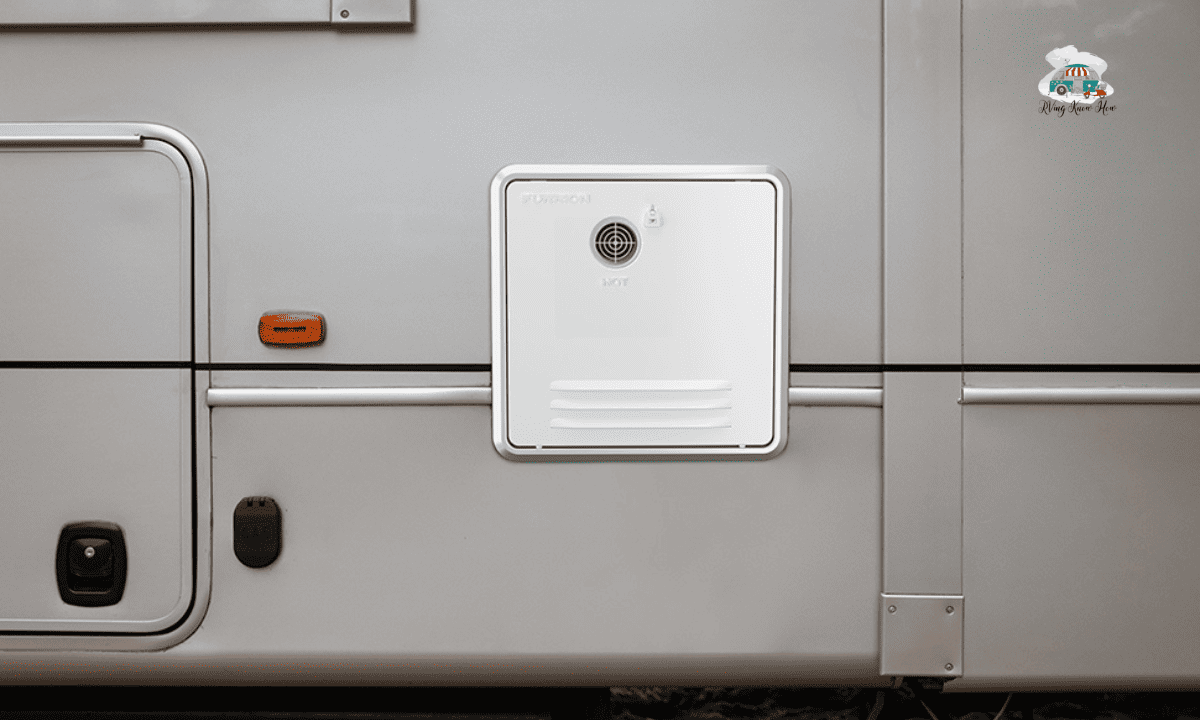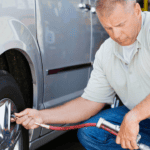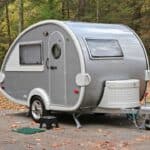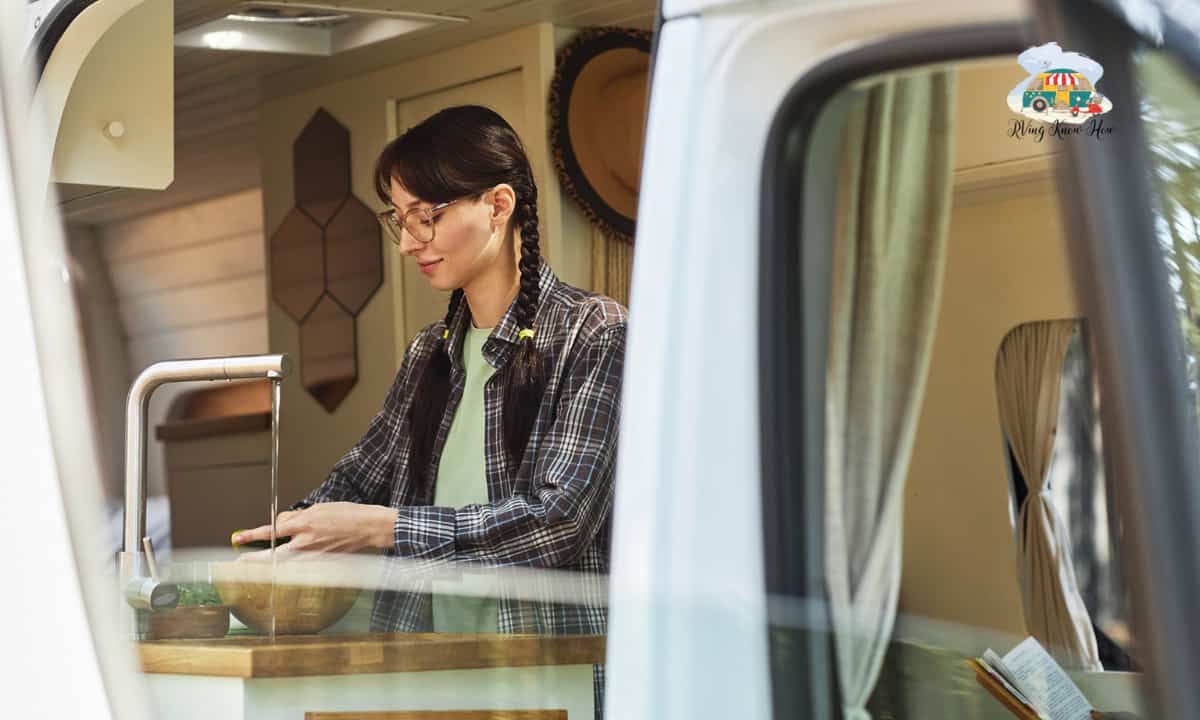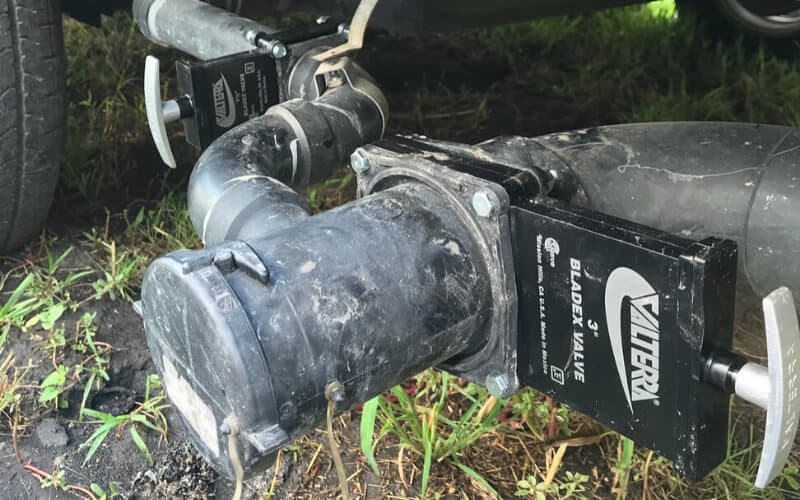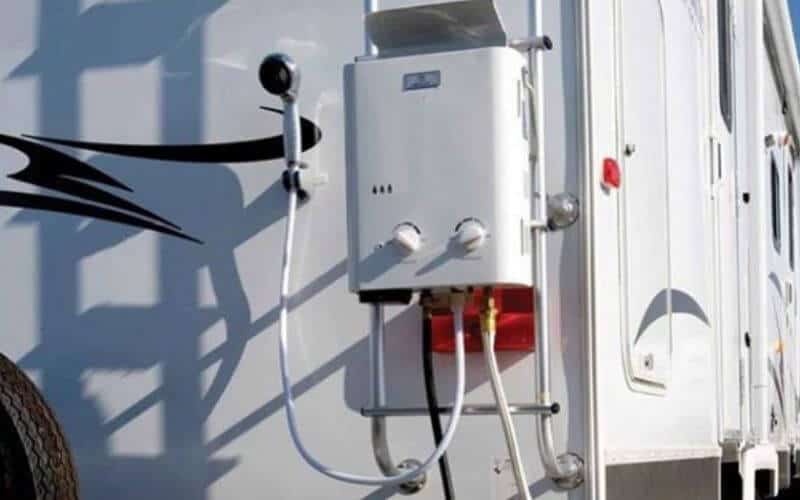When you install an RV tankless water heater, you spend less on propane and electricity bills. It also saves space and up to 100 lbs on your RV. Beyond that, a tankless water heater is a more practical option for full-time RVers who always desire readily available hot water, compared to tanked storage.
Hot water at home is often less appreciated, but it becomes a true luxury when we go glamping or boondocking because we need it readily available when we turn on the tap to wash our hands or take a nice, warm shower.
You probably hear many RVers talk about having tankless water heaters installed on their motorhomes and wonder what advantages it brings compared to the traditional water heaters in these vehicles.
You might miss many benefits if you’ve not upgraded your RV water heater to a tankless one. I’ve been using a propane tankless water heater for my Jayco Alante 26x for the past three years since I saw it advertised in an RV magazine. It has been an excellent experience compared to tanked water heaters.
In the rest of this article, I’ll walk you through how a tankless water heater on your RV can bring you the abovementioned benefits. I will also share some tips on using one based on my experience with the popular RecPro Tankless Water Heater.
How Does an RV Tankless Water Heater Work?
An RV tankless water heater, also known as an RV on-demand water heater, operates by heating water directly as it flows through the unit. Unlike traditional tank water heaters that store and heat a specific volume of water, tankless models provide hot water on demand, eliminating the need for a storage tank.
When you turn the hot water tap on, the cold water runs into the tankless water heater. The unit detects the water flow and activates the heating elements. As the water passes through the heat exchanger, it’s rapidly heated to the desired temperature. The heated water exits the unit and travels to the faucet or shower.
Models like Girard 2GWHAM, Truma AquaGo, FOGATTI, and Furion 2.4GPM are popular in the RV tankless water heater market. Still, these models utilize different heating technologies, such as propane burners or technological heating elements, to heat the water.
For instance, the Girard 2GWHAM utilizes a brushless fan and flow monitor on a 12-volt battery, while the Truma AquaGo operates on propane and requires 12V DC power to run its electronics.
Each model has specific features and capabilities, such as adjustable temperature controls, energy-saving modes, and digital displays for monitoring water temperature.
Installation process and compatibility may vary depending on the RV model and plumbing configuration.
Benefits Of Installing a Tankless Water Heater In Your RV
The US Department of Energy confirmed that homeowners who use less than 41 gallons of water daily with tankless water heaters could see energy savings of up to 34%. But when it comes to motorhomes, there are other advantages beyond energy savings. Here are the significant benefits of opting for a tankless water storage heater in your RV:
1. Instant hot water supply
Traditional RV water heaters take between 20 and 60 minutes to heat up. It means you must wait a while to access hot water whenever needed.
On the other hand, tankless water heaters work on demand by making hot water instantly available once you turn on the faucet. This is an important benefit if you have a large family on the trip.
The waiting time for tankless water heater systems is only subject to the unit’s water flow rate and heating capacity. Still, bringing water to the temperature and transporting it to the shower head or faucet takes seconds.
2. More effective option, especially for full-time RVers
Tankless water heaters only consume propane when in use because the system heats water as needed rather than storing it for future use. There are even models powered by electric mechanisms. So you will use less propane than traditional RV water heaters that heat the entire tank even if you don’t need it.
For this reason, tankless water heaters are a better investment if you’re a full-time RVer, as it saves you money on fuel.
Also, some RV tankless water heaters, such as the EcoTouch 9kW, have a sensor that detects when the line temperatures drop to 40 °F or below.
When this happens, the water heater automatically circulates warm water in the supply lines to prevent pipe freezing. You won’t get this with a conventional tank water heater.
3. You never run out of hot water
Another benefit of using a tankless water heater in an RV is that you can have an endless hot water supply since it heats the water as you use it.
One of the challenges of standard RV water heaters is that they heat only the water stored in them, which may last for one or two quick hot showers.
But with a tankless water heater unit installed, you can access hot water as long as there is a water supply.
4. Energy savings in propane use or electricity bills
I have used traditional tank systems with good thermal efficiency ratings for a reliable power source, but I still use propane to keep the water in the tank hot. With the on-demand water heater system, I can realize some energy savings in propane use.
Tankless water heaters cause the propane unit to use a direct spark ignition to fire the water heater only when you request hot water. So, you’re only heating water when you’re using it.
Also, tankless water heaters can last 20 years or longer, which is five years longer than the estimated lifespan of a storage water heater (between 8 to 15 years).
So, If you plan on keeping your motorhome for a long time, buying a tankless water heater will ensure you don’t regularly purchase a replacement heater—an effective money-saving hack.
5. Saves space and up to 100 pounds of weight on your RV
Tankless water heaters typically take up less space than larger tank water heaters. Most tankless versions have a compact design and can fit into small spaces.
Also, if a gallon of water weighs 8.34 lbs, and a tank takes between six to ten gallons of water, you add about 83 pounds to your load with a tanked water heater system. Plus, each empty tanked water heater weighs about 20 pounds or more.
If you replace an RV water heater with a tankless one, you can save up more than 100 pounds of weight on your RV. This contributes to maintaining your RV’s Gross Vehicle Weight Rating (GVWR) for safe operation as determined by the manufacturer.
Downsides of Tankless Water Heaters
The numerous benefits of using an RV tankless water heater are convincing enough. However, there are some downsides you keep in mind before installing this upgrade on your motorhome.
The most apparent factor is budget. Unlike tanked water heaters, tankless options can be expensive, thus discouraging budget-conscious glampers. So RV owners who do not enjoy on-demand hot water will find it hard to justify the high cost of installing a tankless water heater.
Apart from the budget, I have also noticed that some people still stick to tanked water heaters today because they believe it makes only a little difference since there’s still a short wait for the hot water to flow.
For example, a typical tankless water heater can take between 10 and 20 seconds delay in hot water delivery when you turn on the tap. While this is not a disadvantage, any potential user should know it.
So What’s The Next Step?
If you consider the benefits of tankless water heaters, there’s no doubt that it’s a better option than traditional water heaters, especially in RVs where you have a lot of people.
It gives you water on demand. It’s also highly efficient and saves space and weight on your motorhome. If you’re considering installing one on your RV for your next camping experience, remember to pick the right tankless heater for your RV.
Fortunately, we’ve prepared a separate article that will walk you through the salient factors to consider while choosing a tankless water heater model for your RV, including seven of the best RV tankless water heater based on brands, budget, performance, and installation procedures.
Happy glamping!
FAQs
What are the top brands of RV tankless water heaters?
Truma, Girard, RecPro, Suburban, and Camplux are among the top brands of tankless water heaters for RVs. RecPro is known for its efficient and compact designs, while Girard specializes in reliable, high-performance units. Camplux offers affordable yet durable options, while consumers praise Suburban for its reliability and easy installation.
What is the average cost of installing an RV tankless water heater?
The average cost of installing an RV tankless water heater ranges from $500 to $1,500. According to Consumer Reports, the system costs between $525 and $1,150, while installation can gulp between $800 and $1,500, according to HomeAdvisor.
However, the brand and model of the water heater, installation complexity, and any additional materials or labor required will determine the actual cost. I recommend you consult with a professional for an accurate estimate.
Are high-efficiency tankless water heaters worth it?
Yes, high-efficiency tankless water heaters are worth it. They provide hot water on demand, eliminating the need for a storage tank and reducing energy consumption. They can be more expensive upfront but have longer lifespans and can save you money on utility bills in the long run.
Tanked vs. tankless water heater for RV: Which is better for me?
Tanked heaters store hot water but occupy space and have limited capacity. On the other hand, tankless heaters provide hot water on demand but require higher initial costs. So you’ll need to consider space availability and budget to make the best decision.
However, for RVs, tankless water heaters are generally better. They are compact, lightweight, and provide hot water on demand. They are also energy-efficient and offer convenience, making them a preferred choice for RV owners.

